
The Governor is the ex-officio Chancellor of the state universities. Many a time he is a politician with hardly any academic pretensions, but some try to show off. One such worthy Governor went for inspection to a university. As he entered the library, he saw before him a rack on which the latest arrivals were displayed—among which was a new edition of Shakespeare. “I am glad,” remarked His Excellency, “that you have the latest works of Shakespeare. He is a great writer. I myself have enjoyed reading many of his novels. By the way, can you give me a list of his latest works?”

This anecdote was told at a function by Professor Hashim Ali, when he was the Vice-Chancellor of the Aligarh Muslim University.
Two men died and presented themselves before the pearly gates of heaven. St. Peter asked the first, “What were you doing when you were alive?”
“I was the Vice-Chancellor of an Indian university,” said he.
“You have already suffered the torture of hell on earth and certainly deserve a place in Paradise.”
The next person was asked the same question. “I was the Vice-Chancellor of an Indian university for three consecutive terms.” he replied.
“Put him in Hell,” ordered St. Peter. “He’s got into the habit.”
This brought the house down.

A politically-appointed Vice-Chancellor used to give himself a lot of airs. When a new edition of Who’s Who came to the library, he was sure to find his name in it but it wasn’t there.
“He should be in Who’s He?” remarked a wag in the library.

Another Vice-Chancellor (V.C.) had the habit of saying, “Yes, you are right” to everyone, quite often contradicting himself. Not surprisingly, this caused utter confusion. One evening a group of students came demanding for the cancellation of a cricket match. He said: “You are right,” and ordered cancellation. Moments later, when the cricket captain came to know about this, he rushed to the V.C. and protested: “This cannot be done as the other team has already reached here.” Predictably, the V.C. said: “You are right.”
The wife, who was a witness to this going-on, remarked in disgust: “You say, “You are right, to everyone.”
“You are right, my dear,” out came the pet reply and the wife left the place with utter disgust.

The post of Vice-Chancellor in a Bihar University was lying vacant for a long time as no one was prepared to risk his life. They required a strong man capable of taking on the rowdy students. So, it was seriously considered to invite some famous boxer to take on the job.
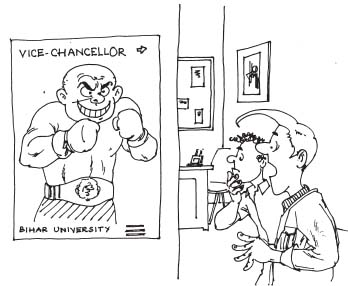

The Vice-Chancellors of several universities in North India have to face the onslaught of union and netas, particularly belonging to the ruling party in the state, and so have to think ways of protecting themselves. It is rumoured that a V.C. of a university in Bihar is contemplating to cover himself up in a suit of steel armour.

The participants at a seminar were thoroughly tired after three days of verbal outpourings by distended, self-important academics. At the valedictory function, the convener, himself, thoroughly exhausted, invited the chief guest. “I now request our revered Vice-Chancellor to give his address.”
“Vice-Chancellor’s Lodge, The University Campus,” said the chief guest and sat down amidst thunderous applause.

In the early fifties of the last century, very few Indians could be seen on English streets, and a South Indian with his turban and all was indeed a rarity. One day, Professor Murthy, visiting the Eastern Philosophy Department at Oxford, was followed by a rowdy bunch of street urchins. He tolerated them for a while, but tired of their unwelcome attention, he turned around and shouted, “What do you want?”
“Coo,” said one. “It speaks too.”

It had been snowing in Quebec for hours when an announcement came on the intercom: “Will the students who have parked on the college drive, please move their cars so that we may start clearing the snow.” Fifteen minutes later came another announcement: “Will the five hundred students who want to move the fifteen cars parked on the college drive return to their classes.”

A moral science teacher was bemoaning the spread of promiscuity and AIDS.
At the end of the class, she asked, “Is there a virgin in this classroom? If there is, let her stand up.” Nobody stood up for a while, and when she was about to resume, she noticed a young married student standing at the back with a baby in her arms.
“Excuse me young lady, did you understand the question? I asked if there was a virgin in the room?”
“Yes ma’am, said the mother, “but did you expect this three-month old baby to stand up by herself?”
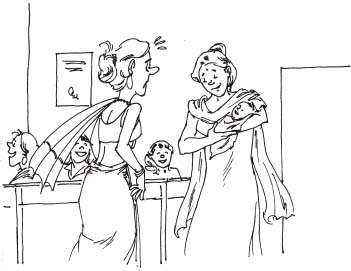

The king of Greece came on a state visit to India in 1962. Welcoming him, President Sarvapalli Radhakrishnan said, “Your Majesty, you are the first King of Greece to come as our honoured guest. Alexander came uninvited.”

In the good old days, when the Indians, who went for study in England, took a lot of taboos with themselves. They were particularly warned by their families about the enticing ways of English girls because at that time for an Indian to bring home an English bride was considered almost sacrilegious and merited ostracisation.
An Indian student ordered at a restaurant: “One coffee and vegetable sandwiches, please.”
“Yes, with pleasure,” acknowledged the pretty waitress.
“Oh, no.” responded the student with alarm. “Only the food please, and no pleasure.”
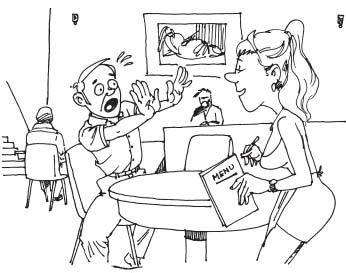

Attempts to ensure gender equality can sometimes have hilarious consequences. A university, trying to eliminate sexism from its adult education prospectus has offered a course in maternity and child care for ‘pregnant persons’.

Gambling is a taboo in some cultures and is considered a sin. So, when the professor at the University of Reading, U.K., wanted to demonstrate a certain concept in statistics, he rolled a dice, but was not sure if the demonstration offended any foreign student in the class. He asked an Indian student: “Is this gambling demonstration offensive to you?”
“No,” he replied. “But for gambling, there would not have been the Hindu epic, Mahabharata!”

A discussion was going on in the staff club about the intellectual attainments of people from various regions of India. It was generally agreed that Bengalis are very brainy but why? The Bengali lecturer boasted that it was due to their fish diet. Though a vegetarian, his Brahmin friend thought that he would test this contention by eating some fish. The Bengali promised to get him fish if he paid him five hundred rupees. So, the Pandit ate a tiny bit of fish supplied by the Bengali. Thinking about the matter, a little later, the Brahmin colleague confronted the Bengali. “Say,” he asked doubtfully, “I don’t think that such a little bit of fish should cost so much.”
“See,” exulted the Bengali, “You eat just a little bit of fish and become immediately wise to understand that five hundred rupees is too exorbitant a cost for a little bit of fish. So, now you know what happens to your brain if you eat fish regularly!”

At the farewell function, the passing out class was asked to tell what this university meant. A student stood up and declared: “My sister and I owe a lot to this university. You see—our parents met here.”


Ramesh had lent some money to his neighbour. The loan was not repaid for long and whenever reminded, the borrower denied that he had ever borrowed any money. Ramesh did not know what to do and decided to seek the advice of his colleague in the psychology department.
“How much was the money?” asked the psychology professor.
“Five hundred rupees.”
Then go to him and demand double the amount.”
“But how will it help me?”
“Do as I tell you and you will see.”
So Ramesh went to his neighbour and demanded, “You had borrowed a thousand rupees from me and now I want it back.”
Off guard, the borrower blurted out, “I had borrowed only five hundred and now you demand a thousand, you crook.”
Later, Ramesh went to his friend and thanked him.
“See, how psychology works,” chuckled the professor.


In those times, when pro-Hindi agitation had swamped the entire country, students of a South Indian physics professor in Delhi University won’t let him teach in English, shouting, “Hindi. Hindi.” Annoyed, one day, he stepped up to the desk of a boy, caught hold of his wrist and said, “First throw away your watch with its imported dial in English and then I will adopt Hindi.”
There was no trouble thereafter.

This happened in the 18th century. Lord Sandwich taunted the author, John Wilkes, “You will die of the pox or the gallows.” Wilkes shot back: “That will depend on whether I embrace your Lordship’s mistress or your Lordship’s principles.”

The economics teacher practised true economy and was a real penny-pinic her. He was complaining about the spendthrift habits of his wife to a colleague. “One day, she asks me for twenty rupees, the next day for fifty, and this morning, she wants a hundred. She is the limit.”
“She certainly is. What does she do with all the money?”
“How should I know? I never give her any!”

The venerable professor of economics complained that his memory was beginning to fade.
“But surely you remember that you borrowed a thousand rupees from me a month back,” reminds a colleague.
“Oh yes! It remains one of my most pleasant memories,” was the reply.

Like many academicians, a professor was averse to any physical exertion. If he was not reading a book, he was watching TV. His worried wife persuaded him to see a doctor. The doctor advised him to get some exercise.
“But I watch golf on the television,” was the man’s defence.
“No, no. This is no exercise; you need more exercise,” remonstrated the doctor.
So now, he watches football on the television.


The professor of economics was describing the distinction between the financial terms ‘bear’ and ‘bull’. He asked one student: “If you made a lot of investment in stocks and the market crashed, what will you be a bear or a bull?”
The student replied promptly: “Actually, an ass!”

A man was standing on the corner of a street with a begging bowl, asking for alms.
One man accosted him: “You appear to be quite an educated man, so why are you begging? Why don’t you find some productive work?”
“Yes, I am a professor, and have written a book on A Hundred Ways to Make Money. This is one way.”


Harold Laski, the noted professor at the London School of Economics, was requested once by the BBC radio to give a talk. The producer said, “Professor, I am afraid we cannot pay you much. The fee will only be five guineas.”
The absent-minded Laski said, “It’s alright. You will have my cheque in the post tomorrow.”

Professor Milkiat Singh was invited at Professor Pandey’s house for dinner. It suddenly started raining heavily and there was no let up even at midnight. Since Mr. Singh’s family was away and he was alone, Mr. Pandey suggested that Mr. Singh spend the night with them. To this, Mr. Singh readily agreed and Mrs. Pandey went to prepare the guest room. Meanwhile, Mr. Singh disappeared and was found returning, dripping wet with a bundle under his arm. “Why, what happened?” enquired Mr. Pandey.
“I thought,” replied Mr. Singh, “that if I have to spend the night here, I may as well get my night dress from my home.”
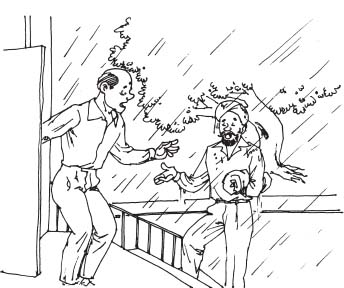

An Indian professor of physics settled in the United States for long, blue-pencilled a doctorate dissertation rather severally, correcting the language and expression. The candidate was not amused and remonstrated, “Sir, how could you find fault with my language—my mother tongue is English.”
To this, the professor remarked: “Your mother tongue may be English, but my wife’s tongue is English. Now, Tell me, have you got more control over your mother or your wife?”

Many people in literature and humanities departments of Indian universities believe that copying from one source is plagiarism but copying from several sources is research.

A professor was disgusted with students, who came to him with absurd questions. Finally, he had a big board put up on the wall behind his desk:
“IT IS BETTER TO REMAIN SILENT
AND BE THOUGHT A FOOL
THAN TO SPEAK
AND REMOVE ALL DOUBT.”

Professor Igor Strovonsky of the Friendship University, Moscow, is a visiting fellow at an Indian University. A victim of Delhi belly, he has now a mantra for eating: “While travelling in India, the rule should be eat, drink and be wary.”

This is a profound observation by Professor Harry Rudin: “If an organization carries the word ‘united’ in its name, it means it isn’t united. Examples are: United Nations, United Arab Emirates, United Kingdom, United States and so on…”

An American visiting professor at the Osmania University, Hyderabad, was invited to dinner by the Dean. The next day when I met him, he had a woebegone countenance. When I asked him how he had enjoyed the Andhra cuisine, he mournfully quipped: “The trouble with Andhra food is that it burns at both ends.”


Politicians in India, particularly in the South, are enamoured to add the title of ‘Dr.’ before their names though they may have no academic accomplishments. The university authorities are also always eager to please their political masters. One such recent holder of the degree of Doctor of Letters, honoris causa got a phone call: “Is Dr. Maranna at home?” His seven-year old son replied: “No, he is not, but he is not the kind of doctor that can do you any good.”

Waiters in restaurants around the university campus are used to the eccentricity of their clients. A professor sat down for lunch and after a look at the menu pulled out a notebook and started scribbling. After half-an-hour, he looked up to find a waiter hovering around him. He shouted, “Waiter, my bill,” and took out his wallet.

British actor Albert Finney received an honorary doctorate from the University of Sussex. When he called up his father to give the news, the parent’s comment was: “Doctor of Letters? You haven’t written us a bloody postcard in three months and call yourself a Doctor of Letters!”

An absent-minded professor, his head buried in a volume, ordered a pizza. The waiter asked: “Sir, do you want it cut into four or eight pieces?”
Without looking up the don murmured: “Four, for I cannot eat eight,” and continued poring over his book.

Two venerable academicians returning from the Nagpur Science Congress were travelling in the same coupe. The one on the upper berth snored like a lion in distress and the other spent the night turning on his berth cursing. When morning came, the snorer got down, yawned and asked his companion, “Professor, did you have a sound sleep?”
“Well,” retorted the victim bitterly, “I had the sound and you had the sleep.”

Harvard University maintains a record of its graduates, but the data are often incomplete. A university official was showing a list of their Nepali alumni to that country’s ambassador. One entry read: Birendra Bir Bikram Shah Dev—occupation unknown. The Nepali official exclaimed: “But that is our king!”

At the end of the class on women fertility, the lecturer asked: “Should women have children after 35?”
A participant after a little thought said: “I think not. Thirty-five children are enough.”
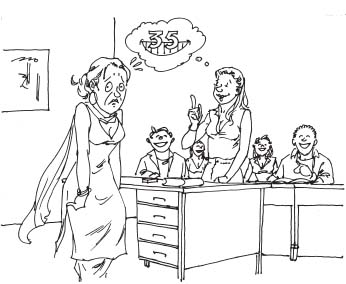

A parent’s lament whose three children are in college: “I am getting poorer by degrees.”

It was love at first sight. After a whirl-wind courtship, the professor from Delhi married the lovely dame from Mumbai attending the seminar. The poor woman did not know that the groom snored like a steam engine. After a while, the lady could not stand the locomotive and left for her mother’s place. She wrote to him from Mumbai: “My love may be blind but not deaf.”

The professor instructed his wife after dinner: “You must remind me tomorrow morning to take my notes to college as I have a lot in my mind and may forget.”
Sure enough his wife forgot and said at the breakfast table, “I forgot what I was supposed to remember, but if you remember, don’t forget.”

Then, this is the story of two married teachers, who quarrelled one evening and vowed not to speak to each other. The husband had an early class and so he wrote a note and pinned it to the wife’s pillow: “Wake me up at 6 a.m.”
Next morning, the wife leaving for her own class pinned a note to her husband’s pillow: “It is time to get up and get ready.”

T he professor came back home after classes and switched on the hall light. He found the light faint and the bulbs glowing feebly. He switched on the dining room light—here too the bulb glowed feebly, the same in the bedroom and the bathroom. Thinking that there was something wrong with the voltage, he called the campus electrician, who found that there was no problem and all the lights were okay. Then he noticed that the professor still had his sun goggles on.
“Oh,” said the professor, taking off the glasses, “sorry.”

Attending a short course at the University of Sussex, an Indian student and a Saudi Arabian were put in the same digs. Both were recently married and had left their wives home. “My wife is very beautiful,” boasted the Indian, taking out his wedding photograph. “So is mine,” averred the Saudi and fished out a photograph showing a beaming young man in wedding finery with his bride by the side covered from head to toe-nails in a black silken burqua.

The professor’s wife was lean and thin but her sister was very corpulent. One day, the sister came to borrow from his wife a silk sari. After the sister left, the professor muttered to his wife: “You are so thin and she is so fat. How do you think your sari is going to ft her?”

The absent-minded professor was told by his wife: “Have you noticed that the baby has started walking?”
“Since when?”
“About a week.”
“Oh, then he must have gone quite far away.”


My professor keeps three glasses, one for near-sightedness, the second for far sightedness, and the third to look for the other two.

The lecturer of biology insisted on absolute punctuality and did not tolerate any tardiness. One morning, a student rushed into his class, five minutes late. “This is intolerable,” shouted the lecturer.
“Sir, I was waiting in queue to buy your latest text book.”
Surveying the class, the lecturer expostulates, “Well, then, why weren’t the rest of you late?”

Newly arrived as a Humboldt fellow in Heidelberg, Germany, I lost the way to my digs. Since my German was inadequate, I stood on the street and was wondering whom to approach for directions, when I saw a Sikh gentleman crossing the street. I eagerly ran to him and told him my problem in Hindi. After giving directions, he asked me in all seriousness, “How did you guess that I was an Indian?”

The professor was deep in his work but suddenly remembered something. He called the gardener: “Go and water the plants.”
“But it is raining,” protested the mali.
“Don’t argue. Take an umbrella,” shouted the don.

The Institute of Fashion & Design was holding a counselling for admission to their first year course. The teacher asked the candidate: “What imaginative and creative work have you done so far?”
Producing his bio-data the candidate said: “Here is the proof, sir.”

Two highly intellectual persons were exchanging notes. One of them said, “I got married as I was tired of washing my clothes, eating in restaurants and wearing socks with holes.”
“Funny,” replied his friend. “I got divorced for the same reasons.”

The widowed lecturer of social sciences and the divorcee professor of home science tied the knot. After some years, a common refrain heard in the household was: “Your children and my children are quarrelling with our children.”

Here is a great professor, who stands before his class and declaims: “I have nothing to say, but I want to say it anyway.”

My professor of physics lost a leg in an accident. An eternal optimist that he was, he quipped: “Now I can save money because I will have to buy a single shoe instead of a pair.”

The wife of the philosophy professor was very concerned about the erratic behaviour of her husband and went to consult a psychologist. “I am very upset, doctor,” said the woman, “my husband seems to be wandering in his mind.”
“Don’t let that worry you,” the doctor replied. “I know your husband. He can’t go far.”

A certain professor of physics, with a large bee in his bonnet, lost the Lok Sabha election, but not relishing being out of power, he managed to get into the Rajya Sabha. A wag remarked wryly: “In physics, if an apple drops from a tree, it falls to the ground. But in politics, the apple sometimes bounces back to the tree.”
Rotten apple?

Two impoverished teachers met in the staffroom. One said: “My wife had a dream last night that she was married to a millionaire.”
The other remarked with a sigh: “You are lucky. My wife always thinks that in the day time.”
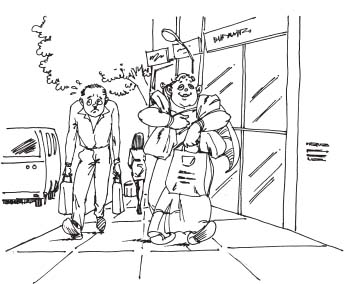

This happened at a conference on fiscal reforms. Professor Naidu set forth the main points covering all aspects of the problem, and his speech was received with great appreciation. Now Professor Rajan was about to follow him but had the same views and found that Professor Naidu had covered all the points, and he had nothing more to say. So, this worthy man got up and said: “Before this meeting, Professor Naidu and I decided to trade speeches. He has just delivered mine and I am grateful for the reception you have accorded it. I regret I have misplaced his speech and can’t remember a thing he intended to say.” Rajan then sat down to a thunderous applause.

A conference-savvy academician says: “I never wear the name tag that is found in the conference kit that is handed out to me, for everyone will know exactly who I am when I fall asleep.”

At a seminar on family planning, a demographer was reeling out statistics: “A woman somewhere in India is giving birth to a child every two seconds.” An agitated woman in the audience shouted, “Then why not one of you go, find her and stop her.”

A lecturer, who had a glad eye for a pretty face but was a bore, was holding forth in the staff club: “I am not in favour of the institution of marriage.”
“No,” remarked a long-suffering faculty: “That’s right. Even your father didn’t marry.” And walked out.

The professor of psychology told his students to imagine that it was a war with Pakistan, and the last plane to leave Karachi was about to take off. The students were to persuade the guard at the bottom of the steps that they had to get on the crowded plane. Each student made a passionate plea. One said that she was pregnant, another that he had to report to the president, a third that he was required in the defence ministry. All pleas failed. Finally, one student ran up to the guard and screamed, “I just have to get on the plane. I am the pilot.”
You now know, who made it to the plane.
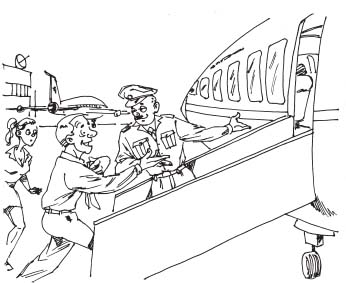

Professor Singh was visiting England and wanted to motor down from London to Leeds. So he phoned the tourist office.
“Please let me know the distance from London to Leeds.”
“272 miles,” he was informed by the inquiry officer.
Professor: “And the distance from Leeds to London?”
“272 miles.”
“Thank you so much,” said the Professor. Inquiry officer: “For what?”
Professor: “Oh! That’s because I thought I had to pay more to travel from Leeds to London than from London to Leeds?”

This is told by Sir Hugh Casson in Raise Your Glasses: When Charles II visited St. John’s College, Oxford, he asked whether he could have a certain portrait of Charles I, but the college demurred.
“I will grant you any favour in return,” said Charles.
“In that case,” said the college, “it is yours.”
“Thank you,” said the King, “and what is your request?”
“Give it back, please,” they said.
He did, and the portrait is still in the college library.

Wives of two university teachers were comparing notes on their husbands.
Said one very proudly, “He can talk on any subject under the sun.”
Not to be outdone, the second boasted, “My husband can do better. He does not even need a subject and can talk, talk and talk.”

The discussion veered round to the age-old problem: Which came first, the egg or the chicken?
Beant Singh got tired and finally expostulated: “You duffers, it is simple, you will get what you order first.”

And finally: Old professors never die; they lose their faculties.
